Scriptures on Financial Prosperity: Unlock Your Divine Wealth!
Imagine standing at the threshold of a new chapter in your life, one where financial breakthrough replaces worry, and abundance—including your money—flourishes in your everyday reality. Overcoming financial challenges is not just a distant dream; it’s possible through the transformative power of scripture. The Bible offers profound insights and Bible verses for financial breakthrough that illuminate paths to prosperity, guiding us to trust in God’s unwavering provision.
As we explore the journey towards financial freedom, seeking God’s guidance through specific bible verses on financial breakthrough becomes essential. These verses serve as anchors during turbulent times, reminding us of His promises and the abundance awaiting those who trust Him. Understanding that true prosperity encompasses not only material wealth but also spiritual growth opens our hearts to a fuller, richer life.
Join us in uncovering how embracing biblical principles can lead to lasting change, both financially and spiritually. Let’s embark on this journey together, discovering the blessings that await us when we align our lives with God’s Word. Your breakthrough is just a prayer away!
Key Takeaways
- Apply the Scriptures: Use the scriptures on overcoming debt, finding employment, business success, and managing your money as a guide for your financial journey. Remember, seeking the guidance of the Lord enhances your prospects for success.
- Financial Stewardship is a Spiritual Practice: Managing finances wisely, whether through budgeting, saving, or investing, is not just a practical necessity but a spiritual duty that reflects one’s faithfulness and trust in God.
- Debt Freedom Encourages Spiritual Freedom: Overcoming and avoiding debt aligns with biblical teachings, emphasizing living within one’s means and seeking liberation from financial bondage to focus more fully on God’s purposes.
- Ethical Conduct and Integrity in Financial Dealings: The Bible underscores the importance of honesty, integrity, and ethical behavior in all financial transactions, viewing these virtues as fundamental to godly living and witness.
- Generosity Reflects God’s Generosity: Cheerful and generous giving is highly valued, with the act of sharing one’s resources seen as a reflection of God’s character and a means to bless others while also cultivating one’s own spiritual growth.
- Trust in God’s Provision in All Circumstances: In times of abundance and in need, the scriptures encourage a steadfast faith in God’s provision, guiding believers to seek spiritual riches and trust in divine care above material wealth.
The Power of Faith in Financial Matters
In today’s challenging economic climate, many face financial struggles that can seem overwhelming. Whether it’s mounting debt, job insecurity, or simply the struggle to make ends meet, these challenges can take a toll on our peace of mind and overall well-being. However, as believers, we have a powerful resource at our disposal: the Word of God.
The Bible is not just a spiritual guide; it’s also a source of practical wisdom for every aspect of our lives, including our finances. By turning to scripture, we can find comfort, guidance, and inspiration to overcome our financial hurdles and achieve the breakthrough we seek.
In this comprehensive guide, we’ll explore powerful Bible verses that speak directly to financial breakthrough and prosperity. We’ll delve into their meaning, historical context, and most importantly, how you can apply them to your own financial situation.
Whether you’re looking to get out of debt, increase your income, or simply develop a healthier relationship with money, these scriptures can provide the foundation for your financial transformation.
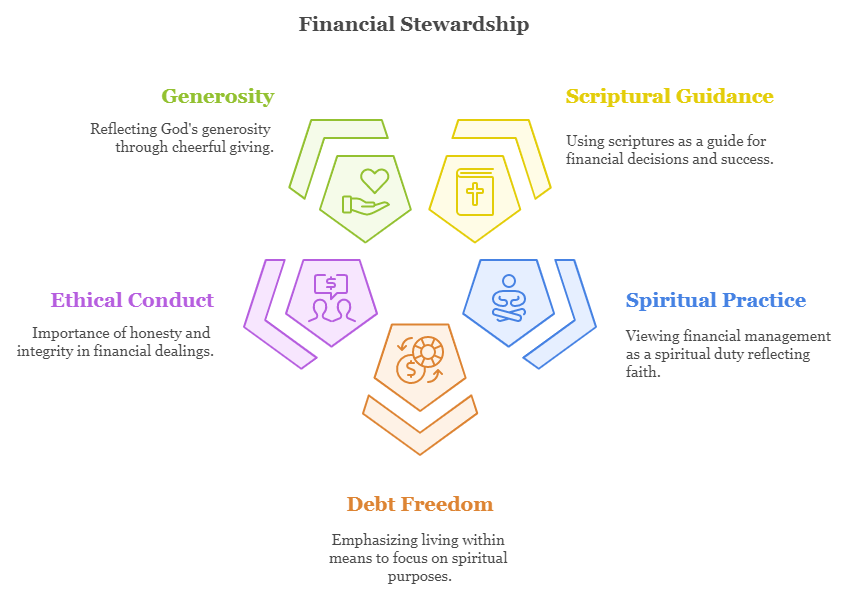
The Biblical Perspective on Prosperity and Financial Breakthrough
Before we dive into specific verses, it’s important to understand the biblical perspective on abundance. Contrary to some popular teachings, the Bible does not promise material wealth to all believers. Instead, it offers a more holistic view of prosperity that encompasses spiritual, emotional, and sometimes material well-being.
True biblical abundance includes:
- Contentment: Finding satisfaction in what our heavenly father has provided (1 Timothy 6:6-8)
- Purpose: Using resources to fulfill God’s calling on your life (Matthew 25:14-30)
- Generosity: Having enough to share with others (2 Corinthians 9:11)
- Freedom: Being free from the bondage of debt and financial stress (Proverbs 22:7)
- Wisdom: Making sound financial decisions based on godly principles (Proverbs 3:13-18)
With this framework in mind, let’s explore the powerful scriptures that can guide us towards financial breakthrough.
Table: insights and biblical guidance provided on managing finances according to spiritual principles.
| Area of Financial Wisdom | Key Scripture | Brief Overview |
|---|---|---|
| 1. Overcoming Debt | Romans 13:8 | Encourages living without debt, emphasizing freedom and financial responsibility. This principle underlines the importance of avoiding financial obligations that can enslave one's future actions and decisions, advocating for a lifestyle that prioritizes financial independence and stewardship. |
| 2. Finding Employment | Colossians 3:23-24 | Stresses the value of working heartily as unto the Lord, highlighting the dignity of labor. It teaches that work is not merely a means to an end but an act of worship and service to God, thus transforming the workplace into an arena for spiritual growth and witness. |
| 3. Business Success | Proverbs 10:22 | Attributes true success to God's blessing, which brings wealth without sorrow. This wisdom emphasizes that genuine prosperity is a byproduct of divine favor, not merely human effort, and that such blessings are accompanied by joy rather than the burdens often associated with wealth. |
| 4. Wealth Management | 1 Timothy 6:17-19 | Advises the wealthy to be generous and to place their hope in God, not in riches. It highlights the transient nature of material wealth and the importance of using riches as a tool for good works and generosity, fostering a sense of purpose beyond mere accumulation. |
| 5. Protection from Financial Scams | Proverbs 11:1 | Highlights the importance of integrity and discernment to avoid falling prey to deceit. In a world rife with financial deception, this guidance serves as a reminder to uphold honesty and exercise caution, ensuring that one's financial dealings reflect godly wisdom and prudence. |
| 6. Provision for Family and Loved Ones | 1 Timothy 5:8 | Underlines the critical responsibility of providing for one's family as a core aspect of faith. This instruction emphasizes that caring for the immediate needs of family members is a tangible expression of one's belief and commitment to God’s teachings, marking it as a fundamental duty of all believers. |
| 7. Generosity and Giving | 2 Corinthians 9:7 | Promotes cheerful and generous giving, emphasizing that it is a reflection of God’s character. This principle encourages believers to give not out of obligation but with joy, mirroring the generosity of God Himself and fostering a culture of giving that extends beyond financial contributions to include time, talents, and personal resources. |
| 8. Saving and Investing | Proverbs 21:20 | Encourages prudent saving and investing for future security and prosperity. It advocates for wise management of resources, ensuring that future needs can be met without resorting to debt, and that one's financial decisions today can lead to a stable and secure tomorrow. |
| 9. Avoiding Greed and Materialism | Luke 12:15 | Warns against greed and materialism, urging a focus on spiritual wealth. This directive cautions against allowing material possessions to dominate one's life, reminding believers that true value and contentment are found in spiritual riches and relationships rather than in the accumulation of goods. |
| 10. Financial Planning and Budgeting | Luke 14:28-30 | Emphasizes the importance of careful planning and budgeting in financial stewardship. By advocating for thoughtful financial management and foresight, this guidance encourages individuals to live within their means, avoid debt, and make provisions for future needs, all within the framework of trusting in God’s provision. |
| 11. Financial Integrity and Honesty | Leviticus 19:35-36 | Stresses honesty and integrity in all financial dealings as foundational to godly living. It calls for uprightness in all transactions, big or small, as a reflection of one’s faith and commitment to living out God’s commandments in every aspect of life, including financial matters. |
| 12. Faith and Trust in God During Financial Hardship | Philippians 4:19 | Encourages reliance on God's provision during times of financial difficulty, affirming His care and provision. This reassurance comforts believers facing financial uncertainty, instilling confidence that God is aware of their needs and will provide for them in accordance with His riches and glory. |

1. Malachi 3:10 – The Promise of Abundant Blessings
“Bring the whole tithe into the storehouse, that there may be food in my house. Test me in this,” says the LORD Almighty, “and see if I will not throw open the floodgates of heaven and pour out so much blessing that there will not be room enough to store it.”
Understanding the Scripture
This powerful verse from Malachi speaks directly to the concept of tithing and God’s promise of abundant blessings. In the context of ancient Israel, the tithe was a tenth of one’s income or produce that was given to support the Levites and the temple. Today, many interpret this as giving a portion of our income to support our local church or charitable causes.
The remarkable aspect of this verse is God’s invitation to “test” Him. This is one of the rare instances in scripture where God explicitly encourages us to put His promises to the test. He assures us that when we are faithful in our giving, He will respond with overwhelming blessings.
Historical Context
To fully appreciate this verse, it’s important to understand its historical context. Malachi was written during a time when the Israelites had become lax in their religious duties, including tithing. The temple and its workers were suffering as a result. God, through Malachi, was calling the people back to faithfulness, promising that their obedience would result in blessings.
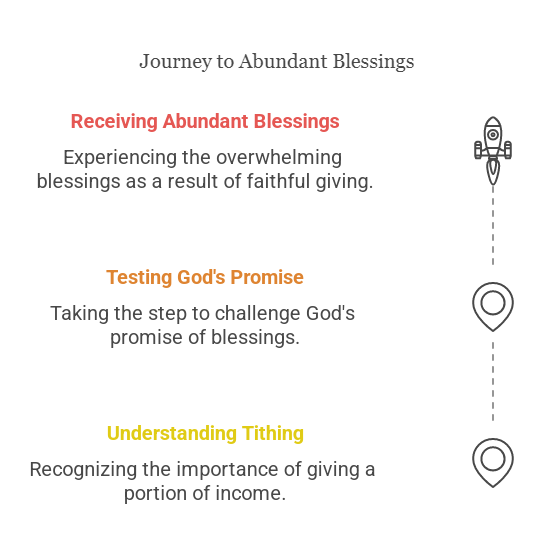
Applying This Verse to Your Financial Life
- Practice Consistent Tithing: Start by setting aside a portion of your income for tithing or charitable giving. This act of faith demonstrates trust in God’s provision. Consider setting up automatic transfers to ensure consistency.
- Cultivate a Generous Spirit: Beyond monetary giving, look for ways to be generous with your time and talents. This could include volunteering at your local church or community organization, or using your skills to help others.
- Trust in God’s Promise: As you give, do so with the expectation that God will fulfill His promise of blessing. This doesn’t always mean financial wealth, but can manifest in various forms of abundance in your life, such as peace, joy, or unexpected opportunities.
- Keep Good Financial Records: To effectively tithe and manage your finances, maintain clear records of your income and expenses. This will help you track your giving and see how God is working in your finances.
- Seek Wisdom in Financial Management: Use the blessings God provides wisely. Consider seeking advice from financial experts or mentors in your church community. Many churches offer financial management courses based on biblical principles.
- Give with the Right Heart: Remember that the motive behind your giving is as important as the act itself. Give out of love for God and others, not out of obligation or expectation of return.
- Start Small if Necessary: If tithing a full 10% seems overwhelming, start with a smaller percentage and gradually increase it as you see God’s faithfulness in action.
- Educate Yourself on Tithing: Study what the Bible says about tithing in both the Old and New Testaments. Understanding the principle behind tithing can help motivate consistent giving.
- Be Patient: Sometimes the blessings that come from faithful giving aren’t immediate or obvious. Trust in God’s timing and look for blessings in all areas of your life, not just financial.
- Share Your Testimony: As you experience God’s faithfulness through tithing, share your story with others. Your testimony can encourage and inspire others in their giving journey.
Remember, the principle behind this verse is not about earning God’s favor through our giving. Rather, it’s about aligning our hearts with God’s generous nature and trusting in His provision. As we step out in faith through giving, we position ourselves to receive the abundant blessings God promises.

2. Philippians 4:19 – God’s Promise to Meet All Our Needs
“And my God will meet all your needs according to the riches of his glory in Christ Jesus.”
Understanding the Verse
This verse, written by the Apostle Paul to the Philippian church, is a powerful reminder of God’s provision for His people. Paul had just thanked the Philippians for their generous gift to him, and he assured them that God would, in turn, take care of their needs.
The phrase “according to the riches of his glory” is particularly significant. It suggests that God’s provision is not limited by earthly standards of wealth, but is in accordance with His infinite resources and glory. This promise isn’t just about material needs, but encompasses all aspects of our lives – physical, emotional, and spiritual.
Historical Context
Paul wrote this letter while he was in prison, likely in Rome. Despite his difficult circumstances, he was filled with joy and gratitude for the Philippians’ support. This context adds weight to Paul’s words – even in the midst of hardship, he was confident in God’s provision and wanted to assure the Philippians of the same.
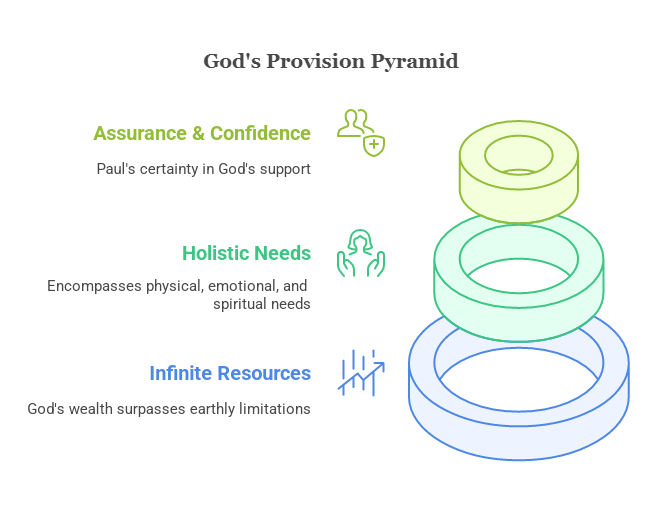
Applying This Verse to Your Financial Life
- Trust in God’s Provision: Cultivate a deep trust that God will provide for your needs. This doesn’t mean you’ll always have everything you want, but it assures that your genuine needs will be met. Start each day by affirming your trust in God’s provision.
- Distinguish Between Needs and Wants: Reflect on what constitutes true needs in your life. Often, our perceived financial struggles stem from confusing wants with needs. Make a list of your actual needs and focus on those, trusting God to provide.
- Practice Gratitude: Regularly acknowledge and thank God for the ways He provides for you, both big and small. Keep a gratitude journal where you record instances of God’s provision daily.
- Be a Conduit of Blessing: As God meets your needs, look for opportunities to be a blessing to others. This creates a beautiful cycle of giving and receiving. Consider setting aside a portion of your income specifically for helping others in need.
- Seek God’s Kingdom First: In Matthew 6:33, Jesus instructs us to seek first the kingdom of God and His righteousness, and all these things will be added unto us. Make pursuing God’s will your primary focus. This might involve aligning your career choices with God’s calling or prioritizing spiritual growth over material gain.
- Develop Contentment: Learn to be satisfied with what God has provided. Paul writes in Philippians 4:11-12 about learning to be content in all circumstances. Practice contentment by focusing on what you have rather than what you lack.
- Recognize God’s Provision in All Forms: God’s provision may not always come in the form we expect. Be open to recognizing His provision through job opportunities, the generosity of others, or unexpected resources.
- Steward Resources Wisely: While trusting in God’s provision, also be a good steward of what He’s already given you. This includes budgeting, saving, and making wise financial decisions.
- Pray Specifically: Bring your specific needs before God in prayer. While He knows our needs before we ask, the act of bringing our needs to Him builds our relationship and trust in Him.
- Share Your Needs with Others: God often works through the body of Christ to meet needs. Don’t be afraid to share your needs with your church community or trusted friends who can pray with you and potentially help.
- Look Beyond Financial Needs: Remember that this verse applies to all needs – emotional, spiritual, relational, as well as financial. Trust God to provide in all these areas.
- Live Generously: Paradoxically, one of the best ways to experience God’s provision is to live generously ourselves. As we give freely to others, we often find that God provides for us in unexpected ways.
Remember, God’s provision often comes in unexpected ways. Stay open to His guidance and be willing to take steps of faith as He leads you towards financial breakthrough. This verse isn’t a guarantee of wealth, but a promise that as we trust in Christ, God will ensure that our true needs are met, enabling us to live for His glory and purposes.

3. Proverbs 3:9-10 – Honoring God with Your Wealth
“Honor the LORD with your wealth, with the firstfruits of all your crops; then your barns will be filled to overflowing, and your vats will brim over with new wine.”
Understanding the Verse
This proverb, attributed to King Solomon, emphasizes the importance of putting God first in our financial lives. The concept of “firstfruits” refers to giving God the first and best of our income or harvest, not just what’s left over. This principle teaches us to prioritize giving to God before allocating our resources elsewhere.
The imagery of overflowing barns and vats represents abundance and prosperity. It suggests that when we honor God with our wealth, He blesses us with more than we need. This doesn’t necessarily mean material wealth, but can also refer to spiritual abundance, contentment, and the ability to be a blessing to others.
Historical Context
In ancient agricultural societies, the “firstfruits” were literally the first and best portion of the harvest. Offering these to God was an act of faith, trusting that the rest of the harvest would come in successfully. This principle carries over into our modern context, teaching us to trust God with our finances even when it seems counterintuitive.
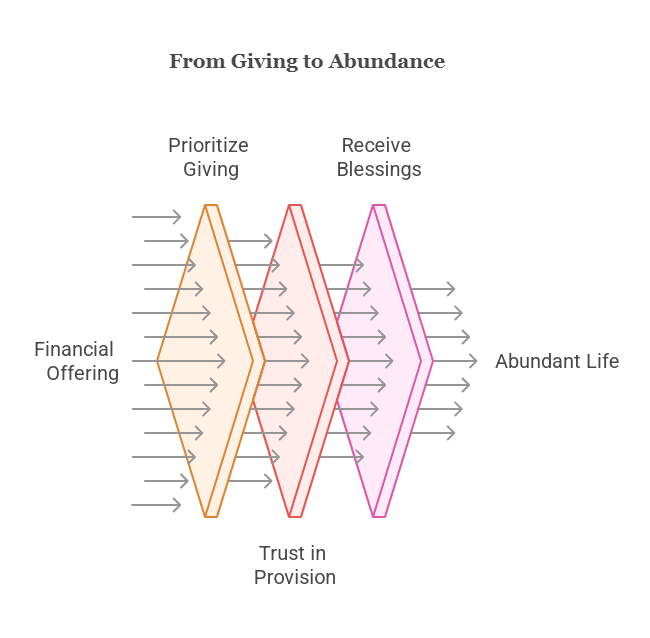
Applying This Verse to Your Financial Life
- Prioritize Giving: Make giving to God (through your church or charitable causes) a priority in your budget, not an afterthought. Consider setting up automatic transfers to ensure your giving comes first, before other expenses.
- Give Your Best: Instead of giving God your leftovers, consider giving from the “firstfruits” of your income – perhaps by setting aside your giving portion as soon as you receive your paycheck. This might mean giving from your gross income rather than your net income.
- Cultivate Generosity: Look for opportunities to be generous beyond your regular giving. This could include helping a friend in need, supporting a worthy cause, or sponsoring a child in a developing country. Develop a “generosity fund” in your budget for spontaneous giving opportunities.
- Manage Your Resources Wisely: Honor God not just through giving, but also by being a good steward of the resources He’s entrusted to you. This includes budgeting, saving, and spending wisely. Consider taking a financial management course or reading books on biblical financial principles.
- Express Gratitude: Regularly thank God for His provision, recognizing that all you have ultimately comes from Him. Start each day by acknowledging God’s blessings in your life.
- Invest in God’s Kingdom: Consider how you can use your resources to further God’s work. This might include supporting missionaries, investing in faith-based organizations, or using your skills to serve in your local church.
- Practice Percentage-Based Giving: As your income increases, consider increasing the percentage you give. This aligns with the principle of honoring God with your wealth as He prospers you.
- Give Joyfully: Remember that God loves a cheerful giver (2 Corinthians 9:7). Cultivate a joyful attitude towards giving, seeing it as a privilege rather than an obligation.
- Teach Generosity: If you have children, teach them the principle of honoring God with their resources from an early age. Help them set aside a portion of their allowance or earnings for giving.
- Seek Accountability: Consider sharing your giving goals with a trusted friend or mentor who can encourage you and hold you accountable.
- Give of Your Time and Talents: Remember that wealth isn’t just about money. Honor God by generously giving your time and talents as well.
- Trust in God’s Provision: As you give, trust that God will provide for your needs. This doesn’t mean you’ll never face financial challenges, but it does mean you can trust in God’s faithfulness even in difficult times.
- Evaluate Your Spending: Regularly review your expenses to ensure they align with your values and the principle of honoring God with your wealth. Are there areas where you could cut back in order to give more?
- Plan for Legacy Giving: Consider how you can honor God with your wealth even after you’re gone. This might include estate planning that incorporates charitable giving.
Remember, the principle here is not about earning God’s blessings through our giving. Rather, it’s about aligning our hearts with God’s generous nature and trusting in His provision. As we honor God with our wealth, we participate in His work and position ourselves to experience His blessings – which often come in forms far more valuable than material wealth.

4. Luke 6:38 – The Principle of Generous Giving
“Give, and it will be given to you. A good measure, pressed down, shaken together and running over, will be poured into your lap. For with the measure you use, it will be measured to you.”
Understanding the Verse
This verse, spoken by Jesus, illustrates the principle of reciprocity in giving. The vivid imagery of a measure being pressed down, shaken together, and running over paints a picture of abundant return. It suggests that when we give generously, we can expect to receive generously in return.
However, it’s important to note that this isn’t a simplistic “give to get” formula. The emphasis is on the attitude of generosity and the principle that our giving sets a standard for what we receive. The verse teaches that generosity begets generosity, both from God and from others.
Historical Context
In the agricultural society of Jesus’ time, grain was often measured in a container and then poured into the buyer’s lap (the fold of the garment). A generous seller would press down the grain, shake the container, and let it overflow, giving the buyer more than the standard amount. Jesus uses this familiar image to illustrate God’s generosity and to encourage His followers to be similarly generous.
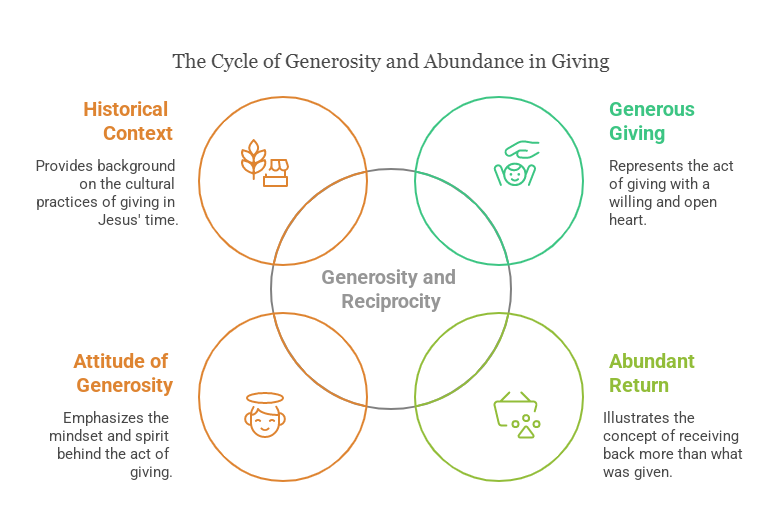
Applying This Verse to Your Financial Life
- Cultivate a Spirit of Generosity: Look for opportunities to give, not just of your money, but also your time, talents, and resources. Start each day by asking God to show you opportunities to be generous.
- Give Without Expectation: While the verse promises return, give out of love and compassion, not with the primary motive of getting something back. Focus on the joy of giving rather than the potential return.
- Be Open to Receive: Sometimes, we find it easier to give than to receive. Be open to accepting help and blessings from others as part of God’s provision. Graciously receiving allows others to experience the blessing of giving.
- Practice Consistent Giving: Make giving a regular part of your financial practice, not just an occasional act. Consider setting up recurring donations to causes you care about.
- Expand Your Concept of Giving: Remember that giving can take many forms beyond money – consider how you can be generous with your skills, time, or encouragement. Look for ways to “give” through acts of service or words of encouragement.
- Give Sacrificially: While not all giving needs to be sacrificial, consider occasionally giving in a way that stretches you or requires you to give up something else.
- Give Anonymously: Jesus taught about giving in secret (Matthew 6:3-4). Try giving anonymously sometimes, focusing on the act of giving rather than recognition.
- Teach Generosity: If you have children or mentor others, teach them about the principle of generous giving. Model generosity in your own life.
- Give to Those Who Can’t Repay: Jesus taught about inviting those to dinner who can’t repay you (Luke 14:12-14). Look for opportunities to give to those who are truly in need.
- Practice Gratitude: Regularly thank God for His generosity to you. A grateful heart often leads to a generous spirit.
- Give First: When you receive income, make giving your first financial act rather than waiting to see what’s left over.
- Diversify Your Giving: Consider supporting a variety of causes – your local church, global missions, local charities, individuals in need, etc.
- Use Your Skills Generously: Look for ways to use your professional skills or hobbies to benefit others without charge.
- Give Joyfully: Remember that “God loves a cheerful giver” (2 Corinthians 9:7). Cultivate joy in your giving.
- Trust in God’s Provision: As you give generously, trust that God will provide for your needs. This doesn’t mean you’ll never face financial challenges, but it does mean you can trust in God’s faithfulness.
- Measure Your Giving: Regularly evaluate your giving. Are you giving in a way that truly reflects the generosity God has shown you?
- Give in All Seasons: Practice generosity not just when it’s easy, but even in times of financial strain. This builds trust in God’s provision.
- Create a Giving Plan: Just as you budget for expenses, create a plan for your giving. This helps ensure that your giving is intentional and consistent.
Remember, the principle here is about cultivating a generous heart and trusting in God’s abundant provision. As you give generously, you participate in the cycle of God’s economy, where blessing flows freely. This verse encourages us to be channels of God’s generosity, trusting that as we give, we will also receive – not necessarily in material wealth, but in the richness of a life lived in line with God’s principles.

5. Deuteronomy 8:18 – The Source of Wealth Creation
“But remember the LORD your God, for it is he who gives you the ability to produce wealth, and so confirms his covenant, which he swore to your ancestors, as it is today.”
Understanding the Verse
This verse, spoken by Moses to the Israelites, reminds us that God is the ultimate source of our ability to create wealth. It challenges the notion that our financial success is solely the result of our own efforts or talents. Instead, it points to God as the giver of the skills, opportunities, and resources that enable us to generate wealth.
The reference to God’s covenant highlights that wealth creation is part of God’s blessing and provision for His people. However, it’s crucial to note that this blessing comes with the responsibility to remember and honor God.
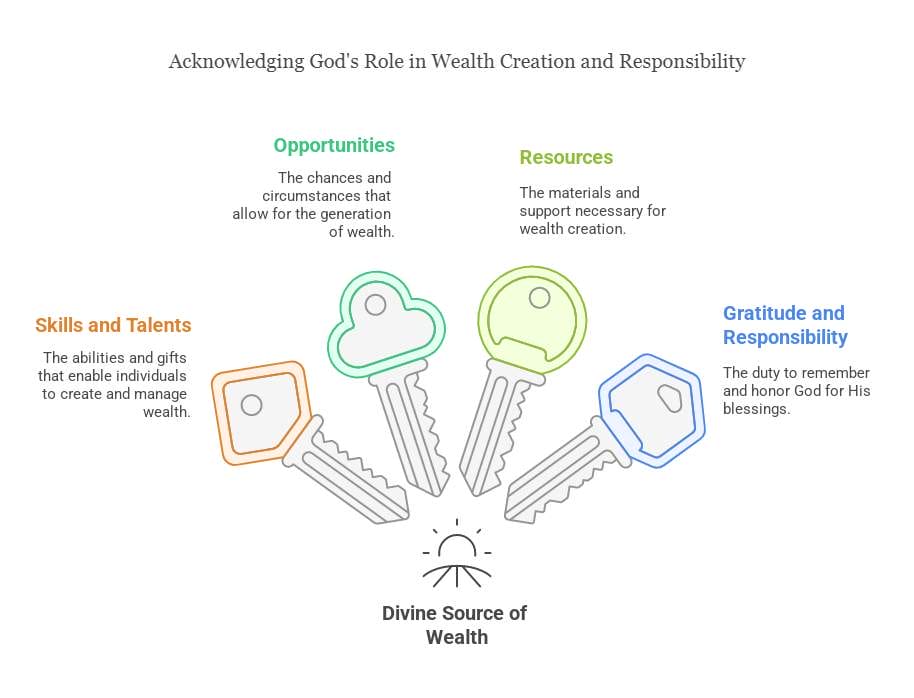
Historical Context
This verse comes from Moses’ farewell address to the Israelites before they entered the Promised Land. He was reminding them of God’s faithfulness during their 40 years in the wilderness and warning them not to forget God once they became prosperous in their new land. This context adds depth to the verse, emphasizing the importance of maintaining gratitude and dependence on God even in times of abundance.
Applying This Verse to Your Financial Life
- Acknowledge God’s Role: Regularly thank God for the skills, opportunities, and resources He’s given you to create wealth. Start each workday with a powerful prayer of gratitude for the ability to work and earn.
- Use Your Abilities Wisely: Recognize that your ability to earn money is a gift from God, and strive to use this gift responsibly and ethically. Consider how your work can honor God and serve others.
- Seek God’s Guidance: As you make financial decisions or pursue career opportunities, seek God’s wisdom and direction. Make prayer a key part of your financial planning process.
- Avoid Pride in Success: Guard against the temptation to become prideful about your financial achievements, remembering that your ability comes from God. Practice humility in your professional and personal life.
- Be a Good Steward: Manage the wealth God allows you to create wisely, using it not just for personal benefit but also to bless others and further God’s kingdom. Develop a budget that reflects your values and prioritizes giving.
- Develop Your Skills: Since God gives the ability to produce wealth, invest in developing your skills and talents. This could include further education, professional development, or learning new skills that can increase your earning potential.
- Work with Excellence: Whatever your job or business, do it with excellence as unto the Lord (Colossians 3:23). This honors the abilities God has given you.
- Remember the Source in Adversity: When facing financial challenges, remember that God is still the source of your ability to produce wealth. This can provide hope and perspective in difficult times.
- Teach Financial Responsibility: If you have children or mentor others, teach them about the source of wealth creation and the responsibility that comes with it. Help them develop a biblical perspective on money and success.
- Give Generously: As you recognize God as the source of your wealth-creating ability, be generous with what He provides. This reflects His generous nature and acknowledges His ownership of all things.
- Seek Opportunities to Create Value: Look for ways to use your skills and resources to create value for others. This aligns with God’s purpose in giving us the ability to produce wealth.
- Practice Contentment: While working diligently, also cultivate contentment with what God has provided (1 Timothy 6:6-8). This balance helps prevent the love of money from taking root.
- Invest in God’s Kingdom: Consider how you can use your wealth-creating abilities to directly support God’s work. This might include using your professional skills to serve your church or supporting mission work.
- Maintain Ethical Standards: Ensure that your wealth-creation activities align with biblical ethical standards. Never compromise your integrity for financial gain.
- Seek Wise Counsel: Surround yourself with godly advisors who can provide wisdom and accountability in your financial decisions (Proverbs 15:22).
- Plan for the Future: While trusting God as the source of your ability to create wealth, also plan wisely for the future. This includes saving, investing, and preparing for potential financial challenges.
- Share Your Testimony: As you experience God’s provision and blessing in your wealth-creation journey, share your story with others to encourage and inspire them.
- Cultivate a Eternal Perspective: Remember that true wealth is not measured in earthly possessions but in our relationship with God and our eternal impact (Matthew 6:19-21).
Remember, this verse doesn’t guarantee wealth to all believers, but it reminds us that when we do experience financial success, we should recognize God as its source and use it in ways that honor Him. It encourages a balanced approach to wealth creation – working diligently while maintaining trust and dependence on God. By keeping this perspective, we can enjoy the blessings of wealth without falling into the traps of greed or self-reliance.

6. Proverbs 10:22 – The Blessing of the Lord Brings Wealth
“The blessing of the LORD brings wealth, without painful toil for it.”
Understanding the Verse
This proverb presents a powerful truth about the nature of God’s blessings. It suggests that true wealth – in its fullest sense – comes as a result of God’s blessing rather than merely through hard work or clever strategies. The phrase “without painful toil” doesn’t mean we don’t need to work or that all work will be easy. Rather, it implies that when we’re aligned with God’s purposes and under His blessing, our work becomes more fruitful and less burdensome.
This verse challenges the common notion that wealth is solely the result of human effort. It reminds us that while diligence is important, ultimate success comes from God’s favor and blessing.
Historical Context
Proverbs, largely attributed to King Solomon, was written to provide wisdom for daily living. Solomon, known for his great wealth and wisdom, understood that true abundance came from God. This proverb reflects the Old Testament concept of blessing, where material prosperity was often seen as a sign of God’s favor. However, it’s important to interpret this through the lens of the whole Bible, including New Testament teachings on wealth and blessings.
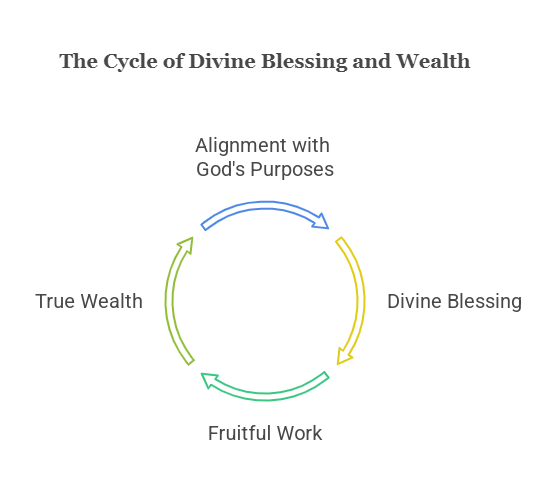
Applying This Verse to Your Financial Life
- Seek God’s Blessing: Make it a priority to live in a way that invites God’s blessing into your life. This includes living with integrity, following God’s principles, and seeking His will. Start each day by inviting God’s presence and blessing into your work and financial dealings.
- Find Purpose in Your Work: Strive to see your work as more than just a means to earn money, but as a way to serve God and others. Look for ways your work can contribute to God’s purposes and bring value to others.
- Trust in God’s Provision: While working diligently, trust that God’s blessing can bring increase beyond your own efforts. Cultivate an attitude of expectancy for God’s supernatural provision.
- Maintain Work-Life Balance: Don’t fall into the trap of overworking or letting the pursuit of wealth consume your life. Trust in God’s ability to provide, allowing you to maintain a healthy balance between work, rest, and relationships.
- Define Wealth Broadly: Remember that true wealth includes more than just money – it encompasses peace, joy, good relationships, and spiritual fulfillment. Regularly assess your “wealth” in these non-financial areas.
- Work with Joy: Since God’s blessing removes “painful toil,” approach your work with joy and enthusiasm. This positive attitude can open doors for greater productivity and opportunity.
- Be Content: Practice contentment with what God has provided, recognizing that contentment itself is a form of wealth (1 Timothy 6:6).
- Give Generously: As you receive God’s blessings, be quick to share with others. Generous giving often invites further blessing (Luke 6:38).
- Seek Wisdom: Proverbs emphasizes the importance of wisdom. Seek God’s wisdom in your financial decisions and career choices (James 1:5).
- Align with God’s Purposes: Consider how your work and financial goals align with God’s purposes. Are you pursuing wealth in a way that honors God and serves others?
- Cultivate Gratitude: Regularly thank God for His blessings, both big and small. A grateful heart positions us to receive more of God’s blessings.
- Invest in Your Skills: While trusting in God’s blessing, also invest in developing your skills and talents. This stewardship of your abilities honors God and positions you for increased fruitfulness.
- Practice Ethical Business: Ensure that your pursuit of wealth aligns with biblical ethics. Never compromise your integrity for financial gain.
- Seek Opportunities: Be alert to opportunities God may bring your way. Sometimes, God’s blessing comes in the form of unexpected open doors.
- Share Your Testimony: As you experience God’s blessing in your financial life, share your story with others to encourage their faith.
- Plan and Prepare: While trusting in God’s blessing, also exercise good stewardship through wise planning and preparation (Proverbs 21:5).
- Rest in God’s Timing: Remember that God’s blessings often come in His timing, not ours. Trust His perfect timing and continue to work faithfully.
- Seek First the Kingdom: In line with Matthew 6:33, prioritize seeking God’s kingdom and righteousness. This proper prioritization often leads to experiencing God’s provision in other areas of life.
Remember, this verse doesn’t promise wealth to all believers or suggest that we don’t need to work. Instead, it offers the assurance that when we live under God’s blessing, our work becomes more meaningful and fruitful. It encourages us to trust in God’s provision while still applying ourselves diligently to our work. The goal is not just financial abundance, but a rich, fulfilling life that comes from living in alignment with God’s purposes and under His blessing.

7. Matthew 6:33 – Seeking First the Kingdom of God
“But seek first his kingdom and his righteousness, and all these things will be given to you as well.”
Understanding the Verse
This verse comes from Jesus’ Sermon on the Mount, where He addresses concerns about material needs. Jesus is teaching His followers to prioritize their relationship with God and the pursuit of His will above all else, including material possessions.
The phrase “seek first” implies that our primary focus and energy should be directed towards God’s kingdom and righteousness. It’s about aligning our lives, including our financial pursuits, with God’s purposes and values.
The promise that “all these things will be given to you as well” refers back to the basic needs Jesus mentioned earlier in the passage – food, drink, and clothing. It’s a reassurance that when we put God first, He will take care of our needs.
Historical Context
Jesus spoke these words to people who were often preoccupied with basic survival needs. By encouraging them to focus on God’s kingdom first, He was calling them to a radical trust in God’s provision. This teaching challenged the common assumption that securing material needs should be our primary focus.
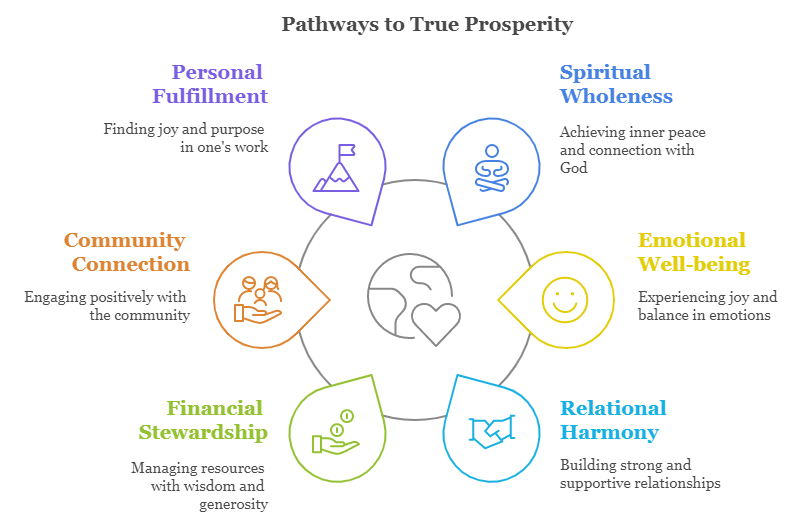
Applying This Verse to Your Financial Life
- Prioritize Spiritual Growth: Make your relationship with God and your spiritual development your top priority, above financial pursuits. Start each day with prayer and Bible study before engaging in work or financial planning.
- Align Your Goals with God’s Kingdom: When setting financial goals, consider how they align with God’s purposes and values. Ask yourself: “How does this goal contribute to God’s kingdom?” This might involve reassessing your career choices, spending habits, or investment strategies.
- Trust in God’s Provision: As you focus on serving God and others, trust that He will provide for your needs. This doesn’t mean neglecting financial responsibility, but rather approaching it with faith and peace.
- Practice Contentment: Learn to be content with what you have, recognizing that true fulfillment comes from your relationship with God, not material possessions. Regularly express gratitude for what God has provided.
- Use Resources for Kingdom Purposes: Look for ways to use your financial resources to further God’s kingdom, whether through giving, serving, or ethical business practices. Consider setting aside a “Kingdom Impact” fund in your budget.
- Redefine Success: Instead of measuring success purely in financial terms, define it by how well you’re serving God and others. This might involve choosing a lower-paying job that aligns more closely with your calling or values.
- Seek God’s Wisdom in Financial Decisions: Before making significant financial decisions, pray for guidance and seek wisdom from Scripture and godly counsel.
- Cultivate Generosity: As you trust God to meet your needs, be generous with what He provides. This reflects the generous nature of God’s kingdom.
- Invest in Eternal Things: While managing your earthly finances wisely, also invest in things of eternal value – relationships, ministry, and spiritual growth.
- Practice Sabbath: Set aside regular time to rest and focus on God, demonstrating that you trust Him to provide even when you’re not working.
- Live Simply: Consider adopting a simpler lifestyle that allows you to be more generous and less focused on material accumulation.
- Educate Yourself on Biblical Financial Principles: Study what the Bible says about money and stewardship. This knowledge will help you align your financial practices with God’s principles.
- Serve Others: Look for opportunities to serve others, both within and outside your profession. This keeps your focus on God’s kingdom rather than personal gain.
- Resist Materialism: Be intentional about resisting the cultural pressure to constantly acquire more. Regularly evaluate your possessions and consider decluttering.
- Teach Kingdom Values: If you have children or influence others, teach them to prioritize God’s kingdom over material pursuits. Model this in your own life.
- Seek Accountability: Find a trusted friend or mentor who can help you stay focused on seeking God’s kingdom first in your financial life.
- Practice Ethical Business: Ensure that your work and business practices align with kingdom values, even if it sometimes means sacrificing profit.
- Tithe and Give Offerings: Practice regular giving as a way of acknowledging God’s provision and supporting His work.
Remember, this verse doesn’t promise wealth, but it does promise that God will provide what we need as we seek His kingdom first. Our role is to trust in His provision and be ready to use what He gives us for His purposes. This approach to finances can bring a sense of peace and purpose, freeing us from the anxiety that often accompanies the pursuit of wealth for its own sake.
By seeking first God’s kingdom and righteousness, we align ourselves with God’s purposes and values. This alignment often leads to a life of greater fulfillment and purpose, where our financial resources become tools for advancing God’s kingdom rather than ends in themselves.

8. 2 Corinthians 9:8 – God’s Grace for Every Good Work
“And God is able to bless you abundantly, so that in all things at all times, having all that you need, you will abound in every good work.”
Understanding the Verse
This verse, written by the Apostle Paul, speaks to God’s ability and desire to provide abundantly for His people. The emphasis here is not just on having enough for personal needs, but having enough to “abound in every good work.”
The phrase “all things at all times” underscores the comprehensive nature of God’s provision. It’s not just about financial resources, but about having what we need in every aspect of life to serve God and others effectively.
The concept of “abounding in every good work” suggests that God’s provision is not meant for our comfort alone, but to equip us for service and ministry to others.
Historical Context
Paul wrote this in the context of encouraging the Corinthian church to give generously to support other believers in need. He was assuring them that God would provide for them as they gave sacrificially. This context adds depth to the verse, showing that God’s provision is often linked to our willingness to be generous with others.
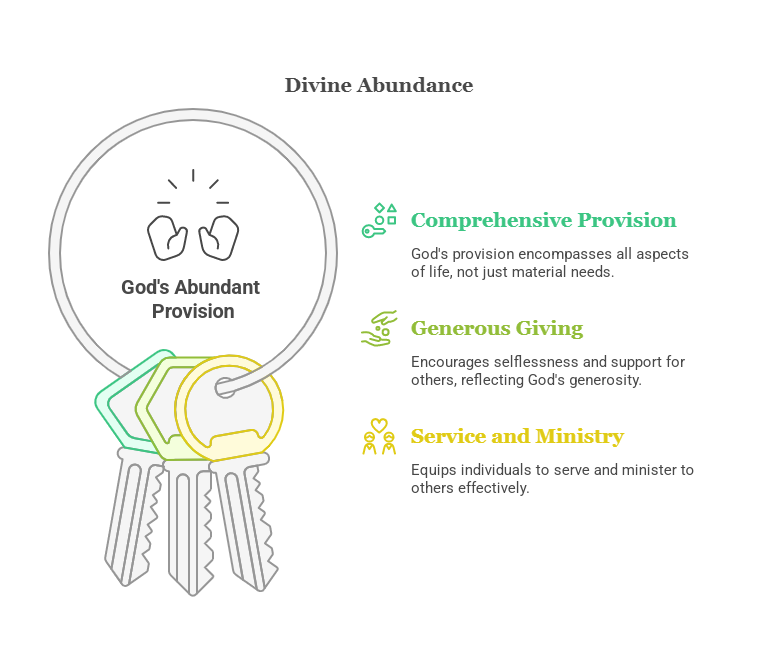
Applying This Verse to Your Financial Life
- Trust in God’s Abundance: Cultivate a mindset that believes in God’s ability to provide abundantly for you. Recognize that as you face financial challenges, God can supply you with what you need not only to survive but to thrive in your calling.
- Look Beyond Personal Needs: As you assess your financial situation, consider how God’s provision enables you to impact the lives of others. When you have enough, you can focus on ways to bless those around you rather than solely on your own circumstances.
- Embrace a Generous Lifestyle: Develop habits of generosity by setting aside a portion of your income for giving. This could mean supporting charitable organizations, helping those in your community, or simply being available to lend a hand to friends and family in need.
- Engage in Service Activities: Seek out opportunities to serve others in practical ways. Whether through volunteering your time, sharing your skills, or providing financial support, look for avenues where you can make a positive difference.
- Pray for Opportunities: Ask God to open doors for you to engage in good works. When you seek out ways to help, stay attentive to how God might be directing your steps towards those who need support—financially, emotionally, or spiritually.
- Keep a Journal of God’s Provision: Track the ways in which God provides for you over time. Reflecting on these moments can build your faith and encourage you to continue trusting God for your current needs while also equipping you to give generously.
- Practice Contentment: Learn to be satisfied with what you have while remaining open to God’s blessings. Recognize that true abundance is not solely measured by material wealth but by the capacity to fulfill the calling He has placed on your life.
- Encourage Others in Generosity: Share testimonies of God’s faithfulness with friends, family, and your church community. Your experiences can inspire others to embrace generosity and trust in God’s provision.
- Be Ready to Respond: Stay alert to opportunities where you can step in and provide help. Whether it’s a neighbor in need or a charitable appeal, being ready to act demonstrates your heart to serve and trust in God’s resources.
- Celebrate God’s Blessings: Regularly acknowledge and give thanks for all the ways God provides. Celebrating these blessings cultivates a joyful spirit and fosters a desire to share what you have received.
Remember, the essence of this verse is a reminder that God’s provision is more than just for ourselves. As He blesses us, we are called to become conduits of that blessing, enabling us to engage in good works that reflect His love and grace to those around us. By trusting in His abundant provision, we not only meet our needs but also become instruments of His work in the world.

Unique Perspectives on Bible Scriptures for Financial Breakthrough
When exploring Bible scriptures for financial breakthrough, it’s essential to go beyond the commonly discussed aspects and uncover fresh perspectives that can provide beginners with unique insights. Let’s delve into seven distinct factors or viewpoints that can enrich your understanding of this topic:
Financial Wisdom through Parables:
- Key Perspective:While many focus on direct verses about money, parables offer profound financial wisdom.
- Example:The Parable of the Talents (Matthew 25:14-30) teaches the importance of responsible stewardship and investing wisely.
- Insight:Recognize that the Bible’s financial teachings often hide within stories, offering valuable lessons beyond what meets the eye.
Community and Mutual Support:
- Key Perspective:Financial breakthrough can involve the power of community and supporting one another.
- Example:Acts 2:44-45 describes early Christians sharing their possessions and providing for those in need.
- Insight:Building a support network and practicing communal generosity can lead to financial stability and blessings.
The Role of Contentment:
- Key Perspective:Contentment can be a catalyst for financial well-being, yet it’s often overlooked.
- Example:1 Timothy 6:6 states, “But godliness with contentment is great gain.”
- Insight:Embracing contentment helps manage desires, curb unnecessary spending, and fosters gratitude for what one has, paving the way for financial peace.
Diligence and Hard Work as Pathways to Prosperity
- Key Perspective: Hard work and diligent effort are essential components of achieving financial breakthrough according to biblical teachings.
- Example: Proverbs 10:4 — “Lazy hands make for poverty, but diligent hands bring wealth.”
- Insight: This perspective highlights that while faith and trust in God are crucial, they should be accompanied by proactive effort and industriousness. Embracing hard work not only leads to financial gain but also honours God by utilizing the talents and opportunities He provides.
Ethical Business Practices and Integrity
- Key Perspective: Maintaining honesty and integrity in all financial dealings invites God’s favour and leads to sustainable prosperity.
- Example: Proverbs 11:1 — “The Lord detests dishonest scales, but accurate weights find favour with him.”
- Insight: This viewpoint emphasizes that ethical conduct in finances is non-negotiable for those seeking true breakthrough. By conducting business honestly and fairly, individuals align themselves with God’s principles, which can lead to trust from others and blessings from God.
The Principle of Sabbath Rest and Trust in Provision
- Key Perspective: Observing rest through the Sabbath reflects trust in God’s provision and can lead to renewed strength and financial insights.
- Example: Exodus 20:8-10 — “Remember the Sabbath day by keeping it holy… On it you shall not do any work.”
- Insight: This perspective suggests that intentionally resting from labour demonstrates faith that God will provide even when we pause our efforts. Rest can prevent burnout, promote well-being, and create space for divine inspiration that contributes to financial breakthrough.
The Temporary Nature of Earthly Wealth and Eternal Investment
- Key Perspective: Focusing on eternal values over accumulating earthly wealth can lead to true financial freedom and contentment.
- Example: Matthew 6:19-20 — “Do not store up for yourselves treasures on earth… But store up for yourselves treasures in heaven.”
- Insight: This angle encourages a shift in priorities from amassing material possessions to investing in things of eternal significance. By valuing generosity, relationships, and spiritual growth over wealth, individuals may find that financial needs are met in unexpected ways, aligning with God’s provision.
These additional perspectives offer a broader understanding of financial breakthrough from a biblical standpoint, emphasizing the integration of faith with practical actions like diligence, ethical conduct, rest, and eternal focus. Incorporating these insights can lead to a more holistic approach to financial well-being grounded in scripture.
Conclusion
In our journey towards financial breakthrough, we are reminded of the Lord’s unwavering presence and His desire to bless us abundantly. By committing to a life of prayer, we invite divine intervention into our financial matters and learn to pray with faith, trusting that Jesus is our ultimate provider. As we manage our money wisely and choose to give generously, we align ourselves with God’s purpose, opening our hearts to His miracles.
The Psalms offer profound wisdom, reminding us of God’s faithfulness in times of need. When we truly embrace the principles of giving and stewardship, we create fertile ground for blessings to flourish. Let us be encouraged to seek financial breakthroughs through our relationship with the Lord, knowing that with each act of faith and generosity, we pave the way for abundant blessings in our lives and the lives of those around us. As we walk this path, may we continually be guided by His Word, trusting that our efforts will bear fruit according to His perfect plan.
Frequently Asked Questions
What biblical principles can help in achieving financial breakthrough?
Embracing principles of stewardship, generosity, and obedience outlined in the Bible can pave the way for financial breakthrough. By managing resources wisely and honouring God with your finances, you open doors to abundance.
How does trusting in God contribute to experiencing financial abundance?
Trusting in God involves surrendering worries about finances and believing that He will provide. This faith not only alleviates stress but also allows room for blessings and opportunities that lead to financial abundance.
Why is giving important according to biblical teachings on prosperity?
Giving reflects a heart of gratitude towards God’s provision. It aligns with the principle of sowing and reaping – as you give generously, you also receive abundantly. Giving not only blesses others but opens up avenues for receiving blessings too.
How can one practically apply biblical teachings on money management for debt freedom?
Applying biblical teachings on money management involves budgeting wisely, avoiding unnecessary debt, living within means, seeking counsel when needed, and prioritising generosity. By following these principles diligently, one can work towards achieving debt freedom.
How does understanding God’s plan for prosperity influence one’s approach towards finances?
Understanding that prosperity encompasses more than just material wealth shifts focus from greed to contentment and responsible stewardship. It encourages seeking spiritual fulfilment alongside financial gain while trusting in God’s timing for provision.

